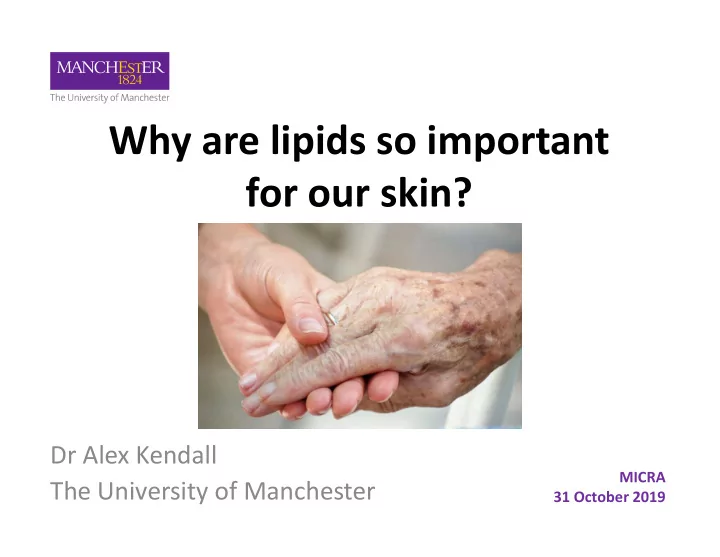

Why are lipids so important for our skin? Dr Alex Kendall MICRA The University of Manchester 31 October 2019
What is a lipid? • Lipids are commonly called fats but they are much more than that. • A very diverse group of substances that have a common property: they do not dissolve in water . Waxes Steroid Cholesterol hormones Vitamins Fats and oils
Lipids can be obtained through our diet… Triglycerides Vitamin A Essential oils Fish oils and fatty acids Omega-3 fatty acids
…or made by our body Cholesterol Vitamin D Prostaglandins
Lipids are important throughout our bodies • Energy storage • Cell membranes • Cell signalling • Inflammation
Lipids have crucial roles in skin
Skin surface lipids
Sebum lipids coat the skin • Waxes, triglycerides, fatty acids • Waterproof the skin and enable terrestrial survival • Maintain skin’s pH • Regulate the microbiome • Protect against UV
The skin barrier
Large, complex lipids form the skin’s cement Ceramides, cholesterol, fatty acids
Ceramides • Large, complex lipids • Made in all cells – Signalling roles • Skin has special ceramides – Form the barrier against water loss • Many personal care products aim to increase ceramide levels
Inflammation
Small lipids regulate inflammation • Fatty acids in your diet are incorporated into your cells • Cells can turn these fatty acids into an array of small bioactive compounds
What we eat determines what lipids we make • Polyunsaturated fatty acids • Omega-6 and omega-3 Arachidonic acid – omega 6 Eicosapentaenoic acid – omega 3
Omega-6 fatty acid products
Omega-3 fatty acid products
Prostaglandins regulate skin inflammation Arachidonic acid Prostaglandins Inflammation
Aspirin blocks prostaglandin production Arachidonic acid Prostaglandins Inflammation
Fatty acids are then metabolised down different pathways Arachidonic acid Prostaglandins Other lipids Inflammation Immune cell response
Prostaglandins from fish oil are anti-inflammatory Eicosapentaenoic acid Prostaglandins Resolution of inflammation
Endocannabinoids • Our bodies produce natural cannabis-like compounds • Regulate mood, appetite, energy storage, stress, pain, sleep • Effective at suppressing skin inflammation Anandamide
Lipids also contribute to Wound healing skin disease Psoriasis Acne vulgaris Sunburn Atopic dermatitis Dandruff Irritant contact dermatitis
How do we study this? Tape strips Suction blister fluid Biopsies
Lipidomics • Mass spectrometry • Extract lipids from samples and identify and quantify hundreds of species • Allows comparison between health and disease, changes over time, assessment of treatments
Our current project
Determining the critical relationship between human epidermal lipids and microbiota in sustaining healthy skin ageing
Skin changes as we age • Skin lipids – Decline in production, altered lipid profile • Skin microbiota – Change in total number and types of bacteria present • Skin function – Thinning, loss of elasticity, more susceptible to damage
How are these changes linked? We are trying to establish the relationship between epidermal lipids and the skin microbiome in healthy skin ageing
Project questions • Q1 : How do the lipid composition of the epidermis and skin function change as we age? • Q2 : How does ageing affect the types and numbers of microbiota at different body sites? • Q3 : What is the sequence of events mediating the age-related changes?
Volunteers • Aiming to recruit 120 volunteers by June 2020 • Healthy volunteers with no skin conditions • 60 aged 18-40 – 30 male, 30 female • 60 aged 70+ – 30 male, 30 female
Sampling sites Armpit Buttock Forehead Sebaceous (oily) Moist Dry, protected from UV damage
Samples and measurements Tape strips Swabs Biopsy Skin pH Skin water loss
Interested in volunteering? • Single visit to Salford Royal Hospital • Complete a food diary for 3 days before visit • Volunteers are reimbursed for inconvenience • For further information and contact details please come and talk to us! Thank you!
Recommend
More recommend